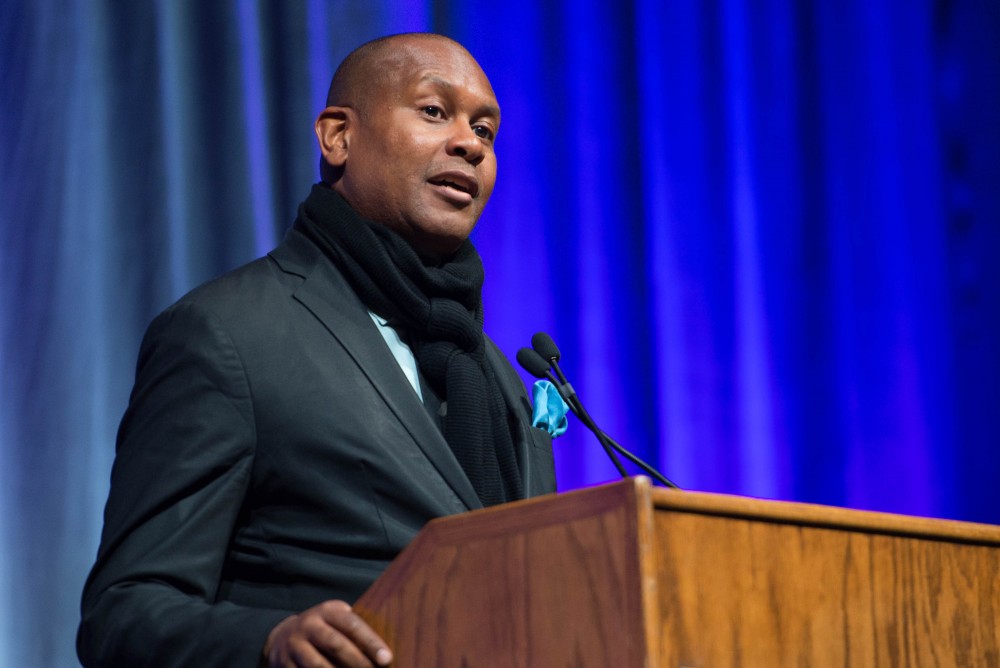‘Peace, love and non-violence’

GVL / Luke Holmes – Kevin Powell speaks in the Fieldhouse Arena on Martin Luther King Jr. Day.
Jan 19, 2017
Martin Luther King Jr. preached many ideas, but none quite as strong or as prevalent as peace, love and non-violence. Kevin Powell, activist and writer, emphasized these points throughout his keynote presentation Monday, Jan. 16.
Powell kicked off the first day of Grand Valley State University’s MLK Jr. Commemoration Week by leading a silent march from James H. Zumberge Hall to the Fieldhouse where he then delivered his speech.
Tying in the rights King fought for during the Civil Rights Movement, Powell talked about inclusion in America, especially when facing the impending inauguration of a controversial president.
“There is no place in our country for disrespect for people, sisters and brothers who are disabled, folks who might be poor, folks who might be lesbian, gay, bisexual, transgender, folks who are women, people of all different racial and cultural backgrounds,” he said. “Whether you’re a Democrat or a Republican or independent, whatever you call yourself a liberal or conservative, (I) don’t know how you can sit in our country over the last 12, 18, 24 months and hear the kinds of things we’ve heard.”
Powell went on to say the things that have been said about immigrants, about Muslims and about women are not only wrong, but terrible things. He offered an example of why the rhetoric against Muslims was wrong, saying people used to have the same mentality against Jewish people, and even against Catholics.
“Real inclusion and real diversity means that everyone in this room is an equal,” Powell said. “Our voices matter equally and our stories matter equally and we should share power equally which means that my contributions to this thing we call America should be equally taught to me everywhere I go.”
He dug into King’s background, going back to his childhood to offer an explanation as to why King thought the way he did. King was born in 1929 into an upper-middle class family in Atlanta Georgia. Although his family was well off in terms of money, the neighborhood they lived in had a mix of upper class, middle class and lower class families living amongst each other.
Powell suggested since King grew up around others who were different than he was, he had a sense of what was right and wrong and, perhaps, he knew to share things with those who were less fortunate than he.
“There’s nothing wrong with having privilege, there’s nothing wrong with being middle class or upper class,” Powell said. “There’s something wrong with having privilege that’s not tied to a sense of humanity or concern for other people.”
Powell focused in on the idea of living the way King would have wanted people to live: free of hatred, division and fear.
Then, Powell presented a challenge to the audience. He urged everyone to know and live by King’s ‘I have a dream’ speech, but to not stop there.
“One of my challenges now to people, more than ever, (is) that you cannot celebrate Dr. King or the Civil Rights Movement or call yourself an American if you don’t have a working knowledge of all of the above,” he said. “We cannot continue to be historically and culturally illiterate—this has got to be as important to us as the Super Bowl.”
Brandon Shamoun, a graduate student attending the speech, loved the interaction Powell had with the audience, saying it added an extra punch to the words he was speaking.
GVSU President Thomas Haas encouraged those in attendance to remember and reflect on what King accomplished in life, calling his work “remarkable.”
“Dr. King wasn’t concerned if it was easy or not—he was concerned if it was right,” Haas said.
Powell has traveled around the United States and around the world to speak about King’s words. He has written 12 books and continually speaks at institutions like GVSU about the Civil Rights Movement.
Brandon Fitzgerald, vice president of student senate’s diversity affairs committee, welcomed Powell to the stage before his speech. Fitzgerald thanked people for attending, noting it was important for the GVSU community to be committed to equality. He also noticed the Fieldhouse wasn’t completely filled, and that there was still work to be done in terms of equal opportunities for all.
“We have to remind our neighbors, our friends, our co-workers, the people that are around us everyday that there is still work to be done,” Fitzgerald said. “Because injustice for one person is injustice for all of us.”

























